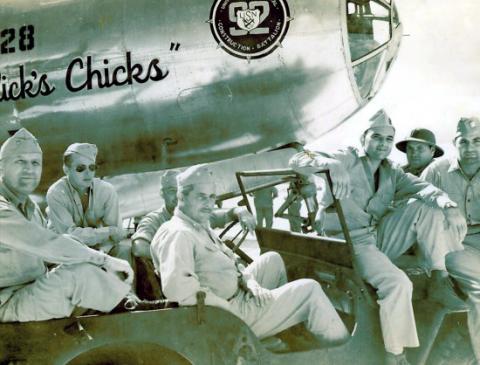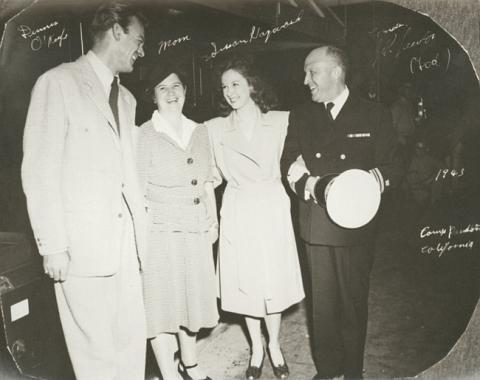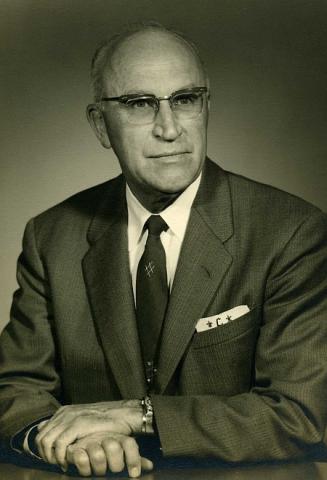Joseph P. Lawlor was born in De Witt, Iowa in 1893, and attended South Dakota State College in 1915 and 1916. He received his bachelor of science degree in civil engineering from the University of Illinois. After serving in WWI as an infantry captain, 1918-1919, he resumed his engineering career. He became assistant manager of Dakota Engineering Co. in Memphis Tenn. in 1921; vice-president of Layne Arkansas Co.; and was secretary-treasurer of Layne Central Co. from 1922-1930, and vice-president and general manager from 1930-1934. In 1934 and 1935 he was chief engineer at Thorpe Well Co. in Des Moines.
As a Navy commander during WW II Joseph Lawlor commanded the 92nd SeaBee Battalion that built an airfield on Tinian Island in the South Pacific. It was from this base that the Enola Gay launched its bombing run to drop the first atomic bomb on Japan.
Lawlor organized General Filter Company at Ames in 1935 and remained president until 1958. He was assistant professor of civil engineering at Iowa State College in 1942-1943. Besides serving as six years as councilman and four years as mayor of Ames, Lawlor was active in many civic organizations, was president of the Iowa Taxpayers Association, and a trustee of the Iowa League of Municipalities. With his wife, Loretto Wiesman, the Lawlors had four children: Marguerite, Joseph Patrick, Conrad, and Leo. After 1958 the Lawlors moved to Florida to retire. Joseph P. Lawlor died March 22, 1982 at his home in Winter Haven, Florida.
The Lawlor exhibit depicts the career of Joseph P. Lawlor (1893-1982) using photographs, artifacts, and textual captions mounted in a portable, hinged, wooden case. Artifacts include: WWI - uniform and helmet, first aid field dressing and pouch, woolen leg wrappings, cartridge belt, and field compass; WW II - blue service coat with campaign ribbons, khaki overseas cap with Navy crest pin, SeaBee postcard; Civilian - General Filter plaque and mechanical pencil, mayor of Ames badge, American Society of Civil Engineers necktie clip, and wife's rosary. Reproductions include: nine photographs, video tape package cover from the film The Fighting SeaBees, resume, and headline from Ames Daily Tribune dated January 4, 1954.
U.S. Sen. Tom Harkin once roomed with the Conrad Lawlor family "back when I was at Iowa State University from 1958 through 1962," he said Saturday during an appearance at the Ames Historical Society. So when Conrad and his brother, Leo, of Ames, asked if he would help obtain medals honoring the military record of their father, the late Joseph Lawlor, Harkin said he was only too happy to help.
In a ceremony attended by friends and family members, Harkin presented the Lawlors with a World War I Victory Button, World War I Victory Medal, World War II Victory Medal, the American and Asiatic Pacific campaign medals for World War II. According to Conrad Lawlor, Joseph Lawlor (1893-1982) was a U.S. Army veteran during World War I and helped with the Pancho Villa campaign along the U.S. Mexican border, joined the Navy during World War II and served as a commander of the Navy Seabees (construction battalion) on Tinian Island.
"He was also one of the Seabees who was chosen to be part of the motion picture, 'The Fighting Seabees,'" Conrad Lawlor said before the ceremony began. The motion picture was filmed at Camp Pendelton, Calif., where Conrad, then a 13-year-old, got to meet actor (and Iowa native) John Wayne, who starred in the movie. Joseph Lawlor was part of a Seabee project to build what was then the world's largest manmade harbor at Tinian, Conrad said. The USS Indianapolis, which carried the first atomic bomb from the U.S. to Tinian, docked at the harbor his father helped to build, he added.
Leo Lawlor made wood cabinets and displays honoring the life of his father, who founded General Filter Company and served as Ames' mayor from 1954 through '57. Harkin said that because so many constituents asked about military honors for their family members, he saw to it that additional money and jobs were added to a program that expedites background checks and the awarding of medals.


































